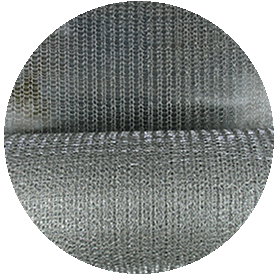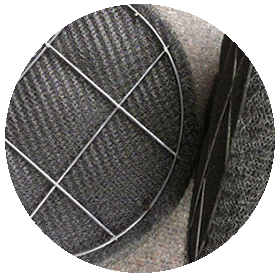
What are knitted meshes and demisters?
Knitted meshes and demisters are essential products for separation and filtration applications in various industries. Knitted meshes are made up of metal threads or synthetic materials intertwined in a three-dimensional pattern, offering a flexible and resistant structure. On the other hand, demisters are systems composed of these meshes, designed to capture liquid droplets in gas flows, improving the efficiency of industrial processes.
What are they used for?
These products play a crucial role in processes where it is necessary to separate liquids from gases or solids from liquids, guaranteeing a cleaner and more efficient operation. They are used in sectors such as:
-
Petrochemical and chemical industry
For the separation of mists and vapors.
-
Ventilation and air conditioning systems
As filter elements.
-
Industrial processes
In distillation towers, condensers and other applications where the goal is to maximize product purity.
Advantages of knitted meshes and demister
- High separation efficiency: They capture microscopic-sized particles and droplets with excellent performance.
- Chemical and mechanical resistance: Ideal for aggressive environments with high temperatures or the presence of corrosive substances.
- Versatility: Available in different materials, densities and configurations to suit specific applications.
- Durability: Its robust design ensures consistent performance over time.
- Easy maintenance: They are usually reusable and easy to clean, reducing operating costs.
Manufacturing of knitted meshes
The manufacturing process consists of braiding metallic threads (such as stainless steel, copper or nickel) or synthetic threads (such as polypropylene or PTFE) in patterns tailored to the customer’s needs. These meshes can be integrated into standard or custom configurations to form part of filtration systems such as defoggers.
Materials used
Knitted meshes and defoggers are manufactured from a wide range of materials depending on the operating conditions:
- Stainless steel (304, 316, etc.)
- Nickel and its alloys
- Copper and bronze
- Synthetic materials such as polypropylene or PTFE


